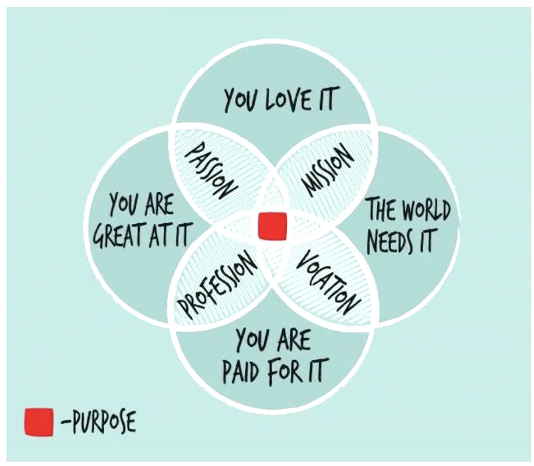Focus on Purpose: It Begs the Question, “Why”?

Have you ever found yourself working on a mindless task at work or in your everyday life, and you suddenly ask yourself,
“Why am I even doing this? What is the point?”
Ultimately, these inquiries reveal a deeper lack of purpose in the activities we humans are pursuing, whether in our profession or in our personal lives.
In order to achieve true fulfillment, you must first understand why you’re doing what you’re doing.
Finding Purpose: An Elusive Endeavor
Purpose can be most simply defined as, “the reason for which something is done or for which it exists.” However, attempting to identify and define one’s purpose is no small undertaking.
As you may imagine, there are many areas within a person’s life which purpose can be discovered and cultivated. Ideally, your purpose will overlap in these core areas of life:
- Personal
- Organizational
- Societal
If you find yourself struggling to identify what your purpose is and where you might discover personal and professional overlap, here is a simple self-inquiry exercise that may help:
Take a moment to ponder each of these questions with intention.
What do I love? What am I passionate about?
In my view, what does the world need?
What am I paid for? (Can I be paid for what I am passionate about?)
What am I great at?
Then, consult this diagram as a compelling representation for how and where we can discover our purpose:

Organizational Purpose: Business Culture Shift
Gone are the days when a “good” salary and pension were enough to retain workers and keep them fulfilled. It’s becoming increasingly apparent that personal purpose can no longer be neglected by organizations.
“There is a trend away from the ‘working to retire’ mentality. We’re working jobs that we feel passionate about or not at all. This means that organizational purpose must be easy to understand and relatable.”
Correspondingly, the emerging generation of workers desires to find meaning and satisfy purpose in their professional lives. To address this desire, organizations need to offer opportunities for development, advancement, movement, impact and purpose.
While salary and benefits are influential factors, they are simply not enough to prevent turnover, let alone drive transformational value.
Additionally, humans no longer want to press themselves into a pre-defined personality with a new employer. Offering a potential business partner the freedom to be their true selves and not just their “work selves” will shift business culture to align individual purpose more readily with organizational purpose.
With this in mind, how is organizational purpose defined?
- Most, if not all organizations know “what” they do
- Some know “how” they do it
- Few know “why” they’re doing it
Organizational purpose is found in the “why”, making it so vital to discover why an organization does what it does.
What is a BRM’s Purpose?
In the spirit of defining purpose, let’s recall BRM Institute’s mission statement,
“Evolve Culture, Build Partnerships, Drive Value; Satisfy Purpose.”
What can BRMs do to strenghten relationships and move towards organizational purpose with intention?
At their core, BRMs are navigators, connectors, and orchestrators within an organization:
Navigator
- The what and where
- Convergence
- Evolve culture
Orchestrator
- Lead innovation
- Drive value
- Unified team – Shared ownership
Connector
- Stimulate, surface, and shape demand
- Break down the walls to promote intellectual and emotional connections
- Strengthen overall relationships to build trust
- Expand networks to continue new relationship building
In an effort to move towards organizational purpose, a BRM’s role as a connector is crucial to building and strengthening relationships within an organization. Under these circumstances, trust is developed.
When trust exists between organizational collaborators, the “why” is realized. Furthermore, collaborating with others who have shared ownership and vision cultivates both trust and purpose. This trust builds contentment; knowing we have business partners who support us even if we fail.
Ultimately, there are only two ways to influence human behavior; we can manipulate it or we can inspire it.
How are you going to challenge yourself and your teams to find your purpose?
For a more in-depth discussion on purpose, check out our recent webinar, Coming Full Circle with BRM Philosophy: Focus on Purpose!

And excellent post, thank you.
I am reminded of when I was teaching a BRM development program in 2006 and the concept of purpose surfaced. We went round the group of about 18 people from a dozen large companies and asked each of them what they thought their purpose was.
All the answers were rather lame except for a senior BRM from a pharmaceutical company. He talked passionately about saving lives and helping sick people enjoy a quality of life they could not otherwise do. At the end of his response, several of us were literally moved to tears by his deep passion and his conviction that what he did as a BRM was connected to the highest purpose imaginable.
It was a very powerful moment I will remember forever.